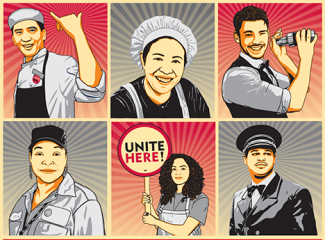BANISHED TO THE ‘BURBS’
Downtown workers want to live where they work

Poster from Unite Here union campaign for hotel service workers
LIFE IN DOWNTOWN TORONTO IS A LOT LIKE LIFE IN DOWNTON ABBEY. The people who service the needs of the those who live there are kept separate from those they work for.
In the TV show Downton Abbey a staircase separates the workers from the lords and ladies living in luxury upstairs; in downtown Toronto it’s the high cost of actually living downtown that does the same thing.
Every day, a small army of these workers leave the only housing they can afford in the remote suburbs surrounding Toronto to board buses, start their cars and climb on the subway to pour the coffee, change the sheets, and serve the food downtown.
The lack of well-paying jobs downtown drives low-paid workers farther out into the suburbs—sometimes even into illegal rooming houses.
Krystyna Nesterenko makes the daily trek to her job at a downtown Toronto hotel from the western edge of Scarborough.
Before she got a car, she faced a 75 minute bus/subway/streetcar combination commute each way. On a weekend shift, she took a “blue night” bus she remembers as “a true hustle” that required her to leave the house at 5 a.m. for a 7 a.m. start time.
But living downtown is “totally unaffordable,” she said.
“The salary range that we are on doesn’t really allow anyone to be spending that much money on housing, it’s just not possible.”
The homeland of the working poor
The Toronto region has the highest percentage of working poor in the country, more than 9 per cent of workers, 264,000 adults living on poverty-level wages, an 11 per cent increase since 2006.
Roberto Perez is 43 years old. He works as a housekeeper at the Toronto Marriott Bloor Yorkville Hotel. He lives 60 km away in Burlington. Roberto looked for a house closer to his work. He looked in Etobicoke, Mississauga, Port Credit, Oakville, Appleby, but had to go even farther west to find a place he could afford. But even Burlington housing is too much for many of his coworkers.
“I don’t live in Burlington because I want to,” he said during a busy lunch hour at the hotel. “People ask me how do you do it? I do it because I have no choice.”
Despite his brutal hour-and-a-half commute on the bus, GO train and subway, Perez considers himself lucky.
He estimates maybe three out of his 150 co-workers live in the downtown core.
Abdalla Idris works as a housekeeper at the Chelsea Hotel in Toronto. He commutes from Scarborough by car and said it can be “frustrating” living so far from work.
“Sometimes we get written up by the management (for being late), they don’t understand how we get here,” he said.
“We want people to have one job, a good living wage, to live in Toronto.”
Not good enough to live here
“We’re basically saying to these workers, you’re good enough to work, but you’re not good enough to live in the city that you work in, and that’s ridiculous,” says Deena Ladd, spokesperson for the Toronto-based Workers’ Action Centre. She says it’s a reality that drives home how important minimum standards like a $15 minimum wage are.
The $14-an-hour Ontario minimum wage is supposed to go up to $15 an hour in January. But Ontario Premier Doug Ford promised to axe the increase during his campaign, and may still scrap it.
Toronto depends on low-wage workers to survive. The failure to make it possible for them to live in the city is a growing threat.
“It really is a bit of a perverse correlation because the more people who are lower income and might not have enough money to own a car are doing some of the longest travelling across the city, on some of the slowest transit service,” said Cherise Burda, executive director of Ryerson’s City Building Institute.
Bad for business
Ignoring this situation could build to be bad for business, says Burda. She points out it could lead to a labour shortage for the service and sales industry downtown, and even businesses closing.
It’s something that’s already starting to happen in downtown Vancouver, where a popular bagel shop had to close one of its locations for a few weeks in August because of difficulty finding staff.
“It is a gutting out of our city if we’re not putting in place the right types of policies and investments to ensure that a range of family incomes can live in the city where they work,” says Burda.
Burda said it’s crucial to build more affordable housing, as well as a transit network to reduce commutes, and “get away from this divisiveness of suburbs vs. downtown.”
- 30 -












Add new comment